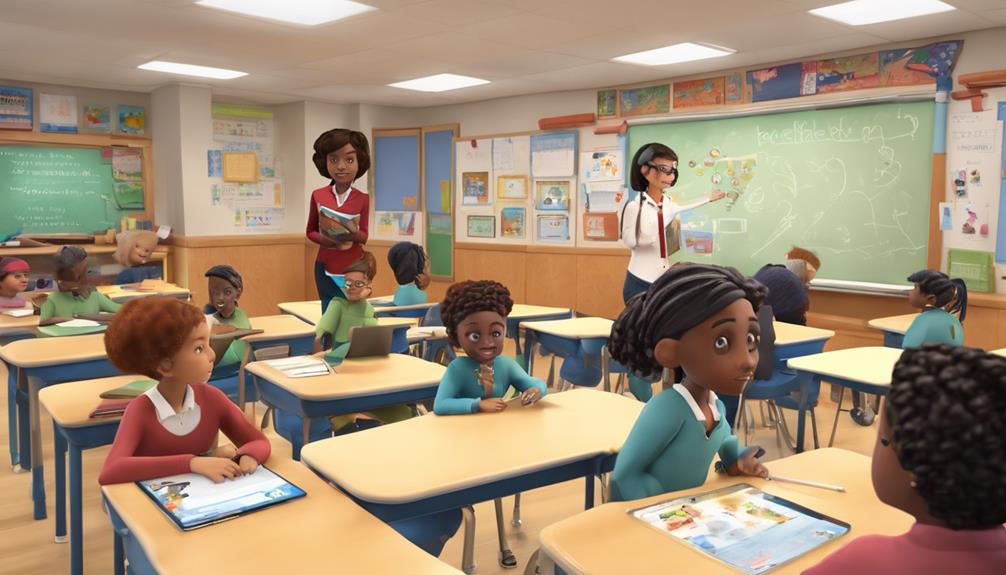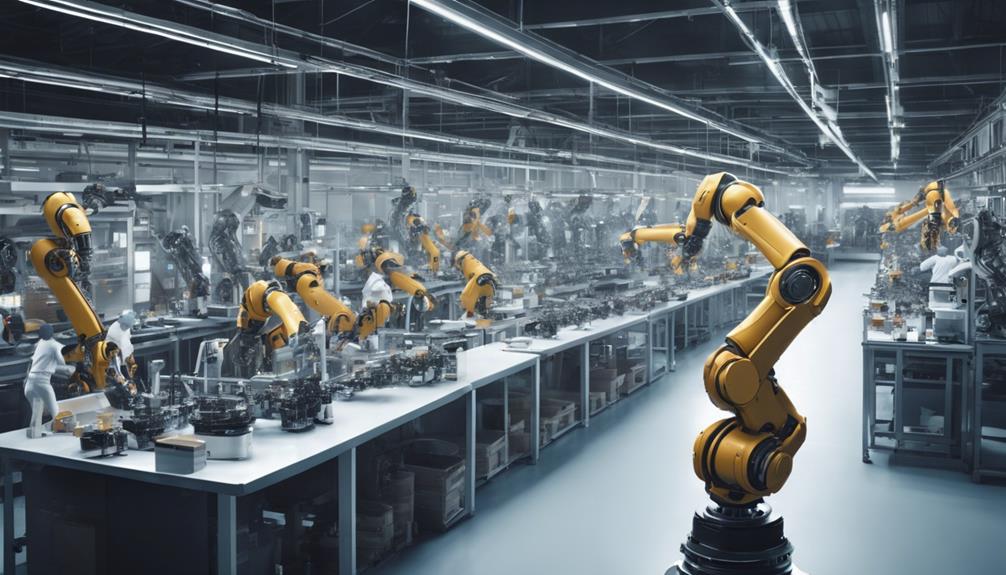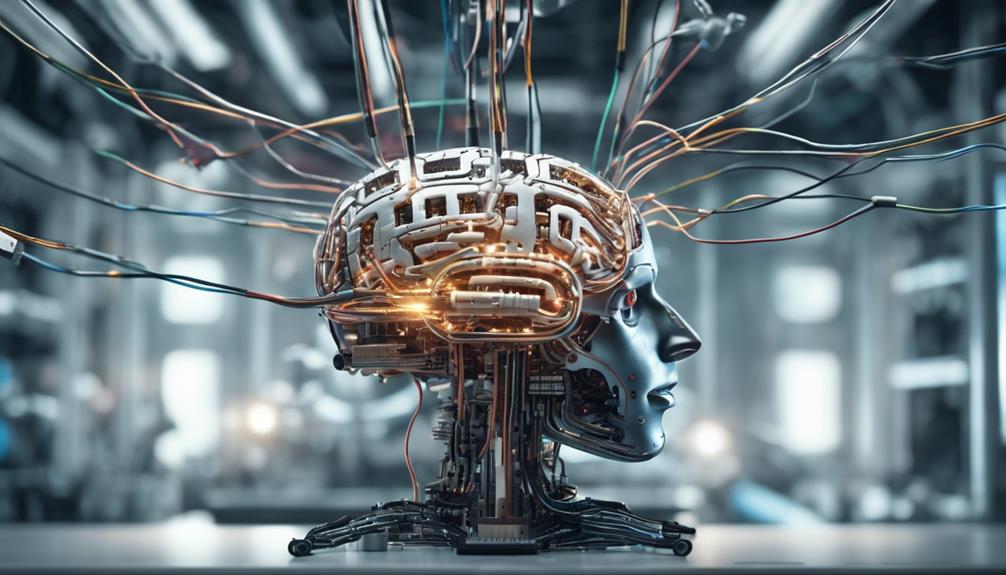In this era of rapid technological advancement, the question of which roles AI will always be incapable of replacing remains a topic of great interest.
While automation has reshaped numerous industries, there are certain professions that continue to rely on distinctly human capabilities. The intricate interplay between human emotions, judgement, and creativity forms the bedrock of areas such as healthcare, creative fields, law, education, and skilled trades.
These roles demand a level of intuition and empathy that machines simply cannot replicate, underscoring the enduring value of human expertise in an increasingly digitized world.
Key Takeaways
- Healthcare relies on emotional skills crucial for patient care.
- Artistic decisions require human creativity and deep emotional connections.
- Legal professionals navigate advocacy with human expertise and strategic thinking.
- Personalized guidance in education fosters deep connections and student well-being.
Healthcare Professions: Human Touch in Healing
Healthcare professions stand at the forefront of emphasizing the irreplaceable human touch in healing, where empathy and compassion play pivotal roles in patient care. While artificial intelligence (AI) has made significant strides in the healthcare industry, it cannot replicate the emotional skills and connections that human healthcare workers provide. Nurses and doctors offer more than just medical expertise; they offer emotional support and personalized care that AI lacks the capacity to deliver. The unique human connection established by healthcare professionals not only enhances patient outcomes but also contributes to overall well-being.
In healthcare professions, critical decisions are often based on complex human factors, requiring judgment and intuition that AI currently cannot match. While AI may assist in certain medical tasks, the essential human element, such as empathy and compassion, remains paramount in patient care. The ability of healthcare workers to understand and address the emotional needs of patients is a skill that defines the essence of healing and sets human intelligence apart from artificial intelligence in the healthcare sector.
Creative Industries: Unmatched Artistic Expression

Artists and designers in the creative industries bring unparalleled creativity and artistic expression to their craft, setting them apart from the capabilities of artificial intelligence. When it comes to the artistic realm, the human touch, emotional depth, and personal experiences infused into creations establish a unique connection with the audience that AI cannot replicate.
Here are some key reasons why the creative industries remain impervious to AI's encroachment:
- Emotional Intelligence: Artists possess the ability to evoke deep emotions and resonate with individuals on a profound level.
- Human Judgment: The discernment and subjective decision-making artists employ in their work are rooted in human experiences and values.
- Creativity: The boundless imagination and innovative ideas artists bring to their projects are driven by human creativity.
- Unique Connection: The authentic connection artists establish with their audience through their work fosters a sense of belonging and understanding.
- Artistic Expression: The diverse forms of expression artists employ capture the complexity and beauty of the human experience in ways that AI cannot emulate.
Legal Professionals: Nuances of Advocacy
Legal professionals, adept at navigating the complexities of advocacy and courtroom procedures, play a pivotal role in interpreting intricate laws and regulations to offer informed legal guidance. Their expertise lies in interpreting complex laws, providing sound legal advice, and considering the ethical implications of legal decisions through human judgment.
Unlike artificial intelligence, legal professionals possess emotional intelligence crucial for effective representation in court. The adaptability and strategic thinking required in the dynamic legal landscape are skills that AI cannot replicate.
The essence of advocacy goes beyond mere interpretation; it involves understanding the nuances of each case, leveraging legal expertise to represent clients effectively. The ethical implications of legal actions, combined with the need for strategic decision-making, highlight the irreplaceable role of legal professionals in the justice system.
In essence, the realm of law requires a human touch that AI, despite its advancements, cannot emulate.
Education Sector: Shaping Future Generations

Education professionals in the modern world play a fundamental role in shaping the future by imparting values, igniting academic curiosity, and fostering a sense of social responsibility among the upcoming generations. Teachers within the education sector provide personalized guidance, emotional support, and individualized attention that are crucial for the holistic development of students.
Here are five key aspects highlighting the significance of educators in shaping the future:
- Teachers instill a sense of social commitment and civic responsibility in students.
- Educators offer personalized guidance to help students make informed academic decisions.
- Human interaction in the education sector fosters a deep connection between teachers and students.
- Emotional support provided by teachers is essential for nurturing the emotional well-being of the next generation.
- The role of teachers goes beyond academics, as they play a pivotal part in molding well-rounded individuals with a strong moral compass and a sense of community engagement.
Skilled Trades: Expertise Beyond Automation
With the advancement of technology and the rise of automation in various industries, the domain of skilled trades stands out for its requirement of expertise that surpasses the capabilities of artificial intelligence. Skilled trades encompass a diverse range of professions that demand hands-on expertise, specialized knowledge, and a unique blend of skills that are challenging for automation to mimic. In trades such as plumbing, welding, and carpentry, human professionals engage in intricate decision-making, problem-solving, and practical applications that necessitate adaptability, precision, and craftsmanship. The table below illustrates the distinctive qualities that skilled trade professionals possess, emphasizing the human touch and expertise essential in these fields.
| Skill | Description | Importance |
|---|---|---|
| Hands-on Expertise | Practical skills acquired through experience | Essential |
| Specialized Knowledge | In-depth understanding of trade-specific techniques | Crucial |
| Problem-Solving | Ability to troubleshoot and resolve complex issues | Indispensable |
| Precision | Attention to detail and accuracy in work | Vital |
Frequently Asked Questions
What Jobs Are AI Proof?
In exploring professions impervious to AI influence, roles heavily dependent on human emotion, empathy, and intricate decision-making like mental health counseling, social work, surgery, law, customer service, and talent acquisition stand resilient against automation.
Which Jobs Are in Danger Due to Ai?
Some professions facing AI-related threats include data entry clerks, mail sorters, and routine manual laborers. The automation driven by AI technology poses risks of displacement in these roles, emphasizing the necessity for upskilling and adaptability.
What Jobs Are in Jeopardy With Ai?
Certain jobs are at risk with the advancement of AI technology, potentially impacting roles that involve repetitive and predictable tasks. Workers in data entry, customer service, and manufacturing sectors may face jeopardy as AI capabilities evolve.
Will Most Jobs Disappear Due to Ai?
It is unlikely that most jobs will disappear due to AI. While automation will transform industries, human creativity, emotional intelligence, and complex problem-solving remain pivotal. Strategic upskilling and retraining efforts can help individuals navigate the evolving job market.
Conclusion
In a world where artificial intelligence continues to advance, certain jobs remain irreplaceable due to their uniquely human qualities and skills. From healthcare professions to creative industries, legal professionals to educators, and skilled trades, these roles require human judgement, creativity, and emotional intelligence that AI cannot replicate.
As the future unfolds, these jobs will continue to shape our society with their irreplaceable human touch, like intricate threads weaving a tapestry of human ingenuity and connection.









